In Which Linda Ballou Shares Part Two of Her Recent ‘Deep Dive Down Under’ ~ Including Palm Cove, Daintree Forest and Sydney
By Linda Ballou, NABBW’s Adventure Travel Associate
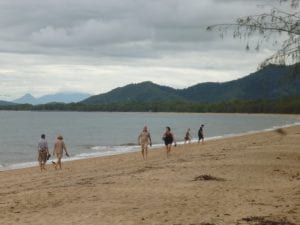 From the extreme arid red center of Australia, our Overseas Adventure Travel group flew to North Queensland during the onset of the “wet season” from January to April. This region receives on average 10-feet of rain each year.
From the extreme arid red center of Australia, our Overseas Adventure Travel group flew to North Queensland during the onset of the “wet season” from January to April. This region receives on average 10-feet of rain each year.
Our gracious accommodations at the Beach House in Palm Cove overlooked a stunning white sand beach. The tropical waters looked inviting, but informed tourists kept to the shore.
Saltwater crocodiles lurk in these waters along with box and stinger jellyfish in the summer. A massive swimming pool replicating a sandy beach in our lux hotel made up for this fact.
Sultry evenings find people strolling the boardwalk and enjoying al fresco dining. The chorus of cicadas and frogs reminds you that you are in a tropical rain forest.
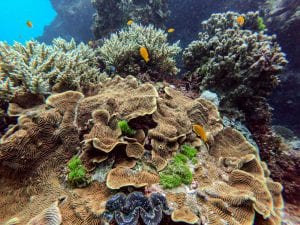 Palm Cove makes a good base of operations as it is halfway between the ancient Daintree Forest and the Great Barrier Reef, the two main attractions in the region. The busy harbor in Cairns is where tourists board vessels for a day of snorkeling and diving on the reef.
Palm Cove makes a good base of operations as it is halfway between the ancient Daintree Forest and the Great Barrier Reef, the two main attractions in the region. The busy harbor in Cairns is where tourists board vessels for a day of snorkeling and diving on the reef.
It was raining the February morning we left for the 30-mile cruise to our first snorkel stop, Simpsons Reef, but it cleared by the time we reached our destination. Stinger jellies are not this far from the shore, but we suited up in lycra stinger suits just in case some did not get the memo.
Half of the 180 passengers on board were celebrating Chinese New Year. Amazingly, we all suited up, were fitted with masks and snorkels, and entered the 80-degree water with military precision. Those who didn’t snorkel took a submarine cruise with viewing windows.
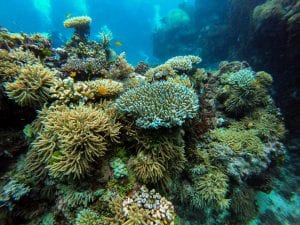 The reef’s coral heads look like giant pudgy brains in colors ranging from murky brown to emerald green and electric blue in an unending variety of shapes and sizes.
The reef’s coral heads look like giant pudgy brains in colors ranging from murky brown to emerald green and electric blue in an unending variety of shapes and sizes.
Fishes of many colors flit in and out of the crannies and cubbyholes that afford protection from predators.
The giant clam that can reach 400 pounds and the giant green turtles are a thrill to spot.
I almost walked on water when I spied two 5-foot moray eels slithering through the reef near the ocean floor. The reef which is over 125 miles in length and has over 3,000 individual reefs and 900 islands, is endangered. The temperature of the water has been getting warmer each year for the last four years.
Climate change is causing acidification, and bleaching of the corals which means death to the reef jeopardizing all the marine creatures that depend upon it to survive.
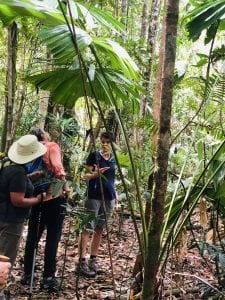 The Daintree Forest and parts of New Guinea are said to be the last remnants of the Godwanaland (a supercontinent that existed from the Neoproterozoic about 550 million years ago until the Jurassic about 180 million years ago).
The Daintree Forest and parts of New Guinea are said to be the last remnants of the Godwanaland (a supercontinent that existed from the Neoproterozoic about 550 million years ago until the Jurassic about 180 million years ago).
We visited the Wet Tropics World Heritage area along Cooper Creek catchment. Neil and Angle Hewett were married here and have lived in the forest for 23 years.
During our nature stroll through the unaltered forest they pointed out insects and reptiles that have mastered the art of camouflage from predators.
In the daytime the forest, shaded by giant fanning tree ferns, is quiet as the creatures like the tree kangaroo and possum that live here are nocturnal.
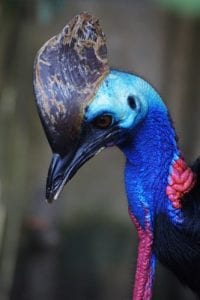 We did, however, spot a Cassowary bird that is vital to the regeneration of the forest. This large, flightless bird (the size of an emu) with dagger-like claws and a brilliant blue collar eats the fruits of the trees and then deposits them, mostly undigested, on the forest floor.
We did, however, spot a Cassowary bird that is vital to the regeneration of the forest. This large, flightless bird (the size of an emu) with dagger-like claws and a brilliant blue collar eats the fruits of the trees and then deposits them, mostly undigested, on the forest floor.
The soil is not good, but the decomposing leaf litter provides nutrients for new growth. Sadly, the Cassowary is threatened by the feral pigs that are eating their eggs and chicks.
This could mean the end of the 180-million-year-old forest. The Hewetts are members of the Daintreeforestfoundation.org and are actively trying to preserve the unique flora and fauna found only in the Daintree Forest.
After our walk we dined on samplings of local fruits and river fish in an open air setting surrounded by lush foliage sporting brilliant blooms. Our gracious host shared the story behind each of the fruits while a gentle rain pattered on the tin roof.
The bush fires that decimated New South Wales were still not contained, but the air was fresh and clear when we arrived at Circular Quay, the ferry transportation hub in Sydney. Ferries from the quay ply the waters of what early voyagers declared “the most beautiful harbor in the world” to outlying towns, coves, and beaches.
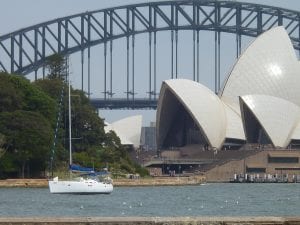 Our first stop in Sydney was a tour of the iconic Opera House with a view of the Harbor Bridge. It is ironic that King George III was convinced by Joseph Banks that this spot would be the ideal location for a colony of felons.
Our first stop in Sydney was a tour of the iconic Opera House with a view of the Harbor Bridge. It is ironic that King George III was convinced by Joseph Banks that this spot would be the ideal location for a colony of felons.
After surviving hideous conditions, many of the convicts became free men and began the work of building what is one of the most cosmopolitan cities in the world.
A “hop on/hop off” double decker bus is the best way to get around this bustling metropolis. A $59 ticket is good for 24 hours with two routes to choose from. You can stop at Bondi Beach, Darling Harbor, Hyde Park and many more famous attractions and hop back on the bus with an audio tour at any of their pick-up points.
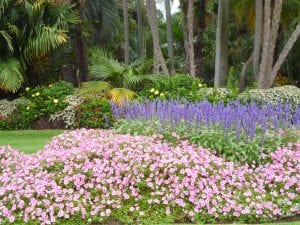 I spent a couple of hours wandering the lovely Royal Botanical Garden that can be reached on a beach walk from the Opera House.
I spent a couple of hours wandering the lovely Royal Botanical Garden that can be reached on a beach walk from the Opera House.
On my free day in Sydney, I caught the fast ferry to Manly where a short stroll past trendy shops takes you to the windswept sea.
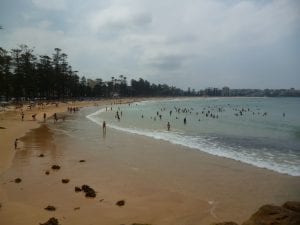 Here surfers ride full-blown waves.
Here surfers ride full-blown waves.
Currents can be strong, so safe swimming areas are posted. A dip in the warm foaming waves brought Hawaii to mind.
Just around the corner snorkelers plied aquamarine waters that are part of a marine preserve.
A bit further on the walk is Shelley Beach where you can swim in placid turquoise waters in a protected cove and dine at the Boat House, a local favorite. A fitting finale to my journey.
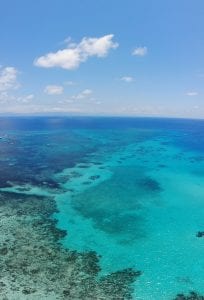 Thank you to Overseas Adventure Travel for this unforgettable Ultimate Australian Adventure!
Thank you to Overseas Adventure Travel for this unforgettable Ultimate Australian Adventure!
Linda
Linda Ballou is an adventure travel writer with a host of travel articles on her site www.LostAngelAdventures.com. You will also find information about her travel memoir, Lost Angel Walkabout-One Traveler’s Tales from Alaska to New Zealand, and Lost Angel in Paradise where she shares her favorite hikes and day trips on the coast of California.
Subscribe to her blog www.LindaBallouTalkingtoYou.com to receive updates on her books, travel destinations and events.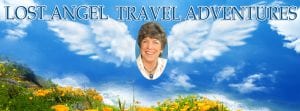
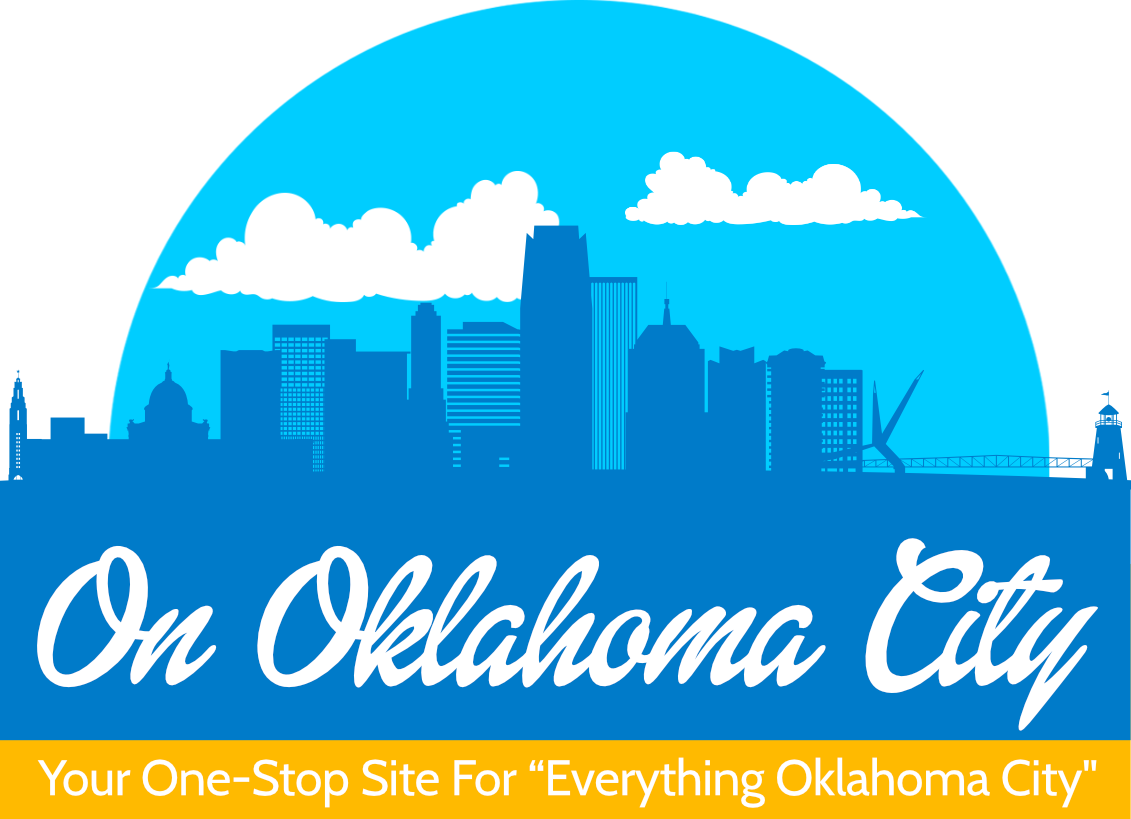
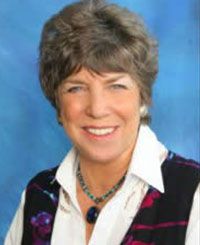
 Linda's mission is to experience as many beautiful places on our planet as she can before they are no more. Travel tales relating her experiences while kayaking, horseback riding, sailing, birding and hiking about the globe have appeared in numerous national magazines. She had great fun collecting travel stories, and profiles of people she met in “naturally high places” for her book, Lost Angel Walkabout-One Traveler’s Tales. Her latest book Lost Angel Unleashed is the third book in her Lost Angel Trilogy
Linda's mission is to experience as many beautiful places on our planet as she can before they are no more. Travel tales relating her experiences while kayaking, horseback riding, sailing, birding and hiking about the globe have appeared in numerous national magazines. She had great fun collecting travel stories, and profiles of people she met in “naturally high places” for her book, Lost Angel Walkabout-One Traveler’s Tales. Her latest book Lost Angel Unleashed is the third book in her Lost Angel Trilogy 